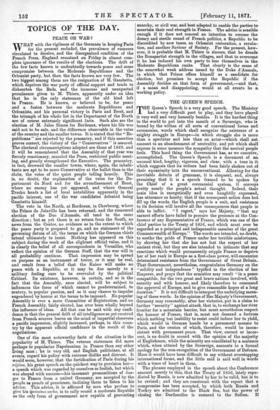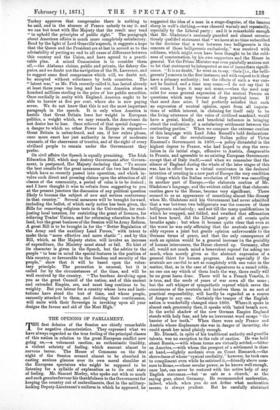THE QUEEN'S SPEECH.
THE Queen's Speech is a very good speech. The Ministry- had a very difficult part to play, and they have played' it very well and very honestly besides. It is the hardest thing in the world to put into the mouth of a Sovereign, who is bound by the withes of all sorts of conventional forms and ceremonies, words which shall recognize the existence of u mighty struggle in Europe—in which struggle she is more than a spectator and less than an actor—which shall not amount to an abandonment of neutrality, and yet which shall express in some measure the sympathy that the neutral people feels. This hard thing the Government has, as we conceive, accomplished. The Queen's Speech is a document of azz., unusual kind, lengthy, vigorous, and clear, with a tone in it which suggests that its writers had been fairly shaken out of their equanimity into the unconventional. Allowing for the. inevitable defects of grammar, it is eloquent, and, always premising that it is a speech framed to be spoken by the Chief of a great ceremonial system, it conveys pretty nearly the people's actual thought. Indeed, their main idea is energetically and even haughtily expressed, has utterance so hearty, that if the consequent action does but fill up the words, the English people is a unit, and resistance to its decision will involve all the consequences that people is
able to inflict. " I regret," says her Majesty, " that my earnest efforts have failed to procure the presence at the Con- ference of any Representative of France, which was one of the chief parties to the Treaty of 1856, and which must ever be regarded as a principal and indispensable member of the great Commonwealth of Europe." The words are intended, no doubt, to soothe the pride of France under her terrible misfortunes, by showing her that she has not lost the respect of her ancient rival, but they are also intended to intimate that any exactions which would permanently cripple France or deprive her of her rank in Europe as a first-class power, will encounter determined resistance from the Government of Great Britain.. That Government, nevertheless, congratulates Germany on the "solidity and independence " typified in the election of her Emperor, and prays that the armistice may result "in a peace compatible, for the two great and brave nations involved, with security and with honour, and likely therefore to command the approval of Europe, and to give reasonable hopes of a long duration." It is not difficult to interpret the underlying mean.- ing of these words. In the opinion of Her Majesty's Government, Germany may reasonably, after her victories, put in a claim to further "security" against attack, that is, to exchange her river frontier for a mountain barrier, but must nevertheless respect the honour of France, that is, must not demand a fortress which nothing but inability to resist could induce her to yield, which would in German hands be a permanent menace to Paris, and the cession of which, therefore, would be incon- sistent with permanent peace. That view, correct or incor- rect, is no doubt in accord with the opinion of the majority of Englishmen, while the minority are conciliated by a sentence which, when uttered by the Sovereign, amounts to a formal apology for the non-recognition of the Government of Defence. More it would have been difficult to say without overstepping international forms, and the little said is said well in words with a trace of heart in them.
The phrases employed in the speech about the Conference amount merely to this, that the Treaty of 1856, lately repu- diated by Russia, is now admitted by her to be valid, but is to be revised ; and they are consistent with the report that a compromise has been accepted, by which both Russia and Turkey are admitted to the Black Sea, but the power of closing the Dardanelles is restored to the Sultan. If
Turkey approves that compromise there is nothing to be said, and in the absence of France nobody to say it, and we can but trust with Her Majesty that the result may tend " to uphold the principles of public right." The paragraph -about American affairs is much more completely satisfactory. Read by the light of Lord Granville's speech, it suggests a hope that the Queen and the President are at last in accord as to the advisability of putting an end to all cause of difference between this country and the Union, and have agreed to a practi- cable plan. A mixed Commission is to consider them all,—the Alabama claims, public and private, the fishery dis- putes, and we doubt not the navigation of the St. Lawrence, and to suggest some final compromise which will, we doubt not, be accepted without reluctance by both countries. The " latent war," as Mr. Fish recently called it, has lasted already at least three years too long, and has cost America alone a hundred millions sterling in the price of her public securities. 'Once cordially in amity with England, America ought to be able to borrow at five per cent. where she is now paying seven. We do not know that this is not the most important paragraph in the speech. It is only when America is hostile that Great Britain loses her weight in European politics, a weight which, we may remark, the Americans do not desire her to lose. Once relieved of that special danger- -a danger to which no other Power in Europe is exposed- -Great Britain is unburdened, and can, if her rulers please, once more exert her just authority in favour of moderate counsels, of the observance of treaties, and of the right of every -civilized people to remain under the Government they prefer.
On civil affairs the Speech is equally promising. The Irish Education Bill, which may destroy Government after Govern- ment, is postponed, Her Majesty declaring that, " To secure -the best results for the great measures of the two last Sessions which have so recently passed into operation, and which in- volve such direct and pressing claims upon the attention of all 'classes of the community, a period of calm is to be desired ; and I have thought it wise to refrain from suggesting to you at the present juncture the discussion of any political question likely to become the subject of new and serious controversy in that country." Several measures will be brought forward, ..inclading the ballot, of which early notice has been given, the Bills for removing religions tests in the Universities, for read- justing local taxation, for restricting the grant of licences, for relieving Trades' Unions, and for reforming education in Scot- land, but the great business of the Session will be Army Reform. A great Bill is to be brought in for the " Better Regulation of 'the Army and the auxiliary Land Forces," with intent to make them "more effective and more elastic " ; and by this Bill, which, as Her Majesty states, will involve an increase of expenditure, the Ministry must stand or fall. No hint of its character is given in the Speech, but the advice to the people " to bear in mind the special features in the position of this country, so favourable to the freedom and security of the people," show that it will be based upon the volun- tary principle. The peroration is unusual, but it is called for by the circumstances of the time, and will be well received by the country. " The burdens devolving upon you as the great Council of the nation, and of this ancient and extended Empire, are, and must long continue to be, weighty. But you labour for a country whose laws and insti- tutions have stood the test of time, and whose people, -earnestly attached to them, and desiring their continuance, will unite with their Sovereign in invoking upon all your designs the favour and aid of the Most High."































 Previous page
Previous page